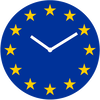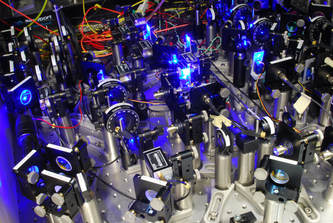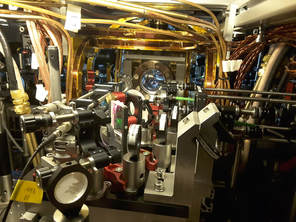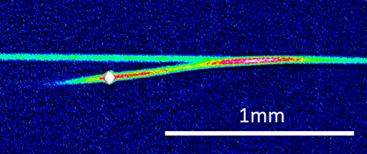Positions in Amsterdam
We, the Amsterdam team, have three open PhD positions and a research assistant position connected to iqClock (status August 2019). On these positions you will work together with the Copenhagen group to develop a continuous superradiant clock operating on the kHz line of Sr (Tasks 2), with the Torun group to develop a continuous superradiant frequency standard operating on the Sr clock transition (Task 3) and together with the Vienna and Innsbruck theory groups to explore the foundations of continuous superradiant lasing on a dedicated apparatus (Task 4).
The basis of our contributions are the techniques we developed for our ongoing continuous atom laser project. We are able to create the Sr atomic beams with unprecedented brightness and steady-state Sr samples close to quantum degeneracy, far beyond the performance presented in our last publication on the topic. A key aspect of our techniques is that the beam of ultracold Sr atoms is available in a region with very little laser cooling straylight. This fact is important for the creation of continuous superradiant lasers, since scattering of photons will lead to decoherence of the superradiantly lasing ensemble. In Task 2 we will simplify our technology and merge it with the Sr cavity QED know-how of the Copenhagen group to build a superradiant clock on the Sr kHz line. The source will be built and tested together with a Copenhagen team member in Amsterdam and then transported to Copenhagen. A more complex source will be designed for the continuous superradiant frequency standard (Task 3) that will be developed with the Torun group. A third apparatus combining our continuous Sr source with a high finesse cavity will be built in Amsterdam and remain there to study fundamental aspects of superradiant lasing (Task 4). Our ideas range from the study of many-body effects in driven-interacting systems to cavity-cooling of a stream of atoms to quantum degeneracy, forming a continuous atom laser.
For more information please contact Florian Schreck. Our group webpage is www.strontiumBEC.com and on it you will find further projects, which all have open PhD positions. We will consider applications as they are received with flexible starting dates, and the positions will remain open until suitable candidates have been identified.
The basis of our contributions are the techniques we developed for our ongoing continuous atom laser project. We are able to create the Sr atomic beams with unprecedented brightness and steady-state Sr samples close to quantum degeneracy, far beyond the performance presented in our last publication on the topic. A key aspect of our techniques is that the beam of ultracold Sr atoms is available in a region with very little laser cooling straylight. This fact is important for the creation of continuous superradiant lasers, since scattering of photons will lead to decoherence of the superradiantly lasing ensemble. In Task 2 we will simplify our technology and merge it with the Sr cavity QED know-how of the Copenhagen group to build a superradiant clock on the Sr kHz line. The source will be built and tested together with a Copenhagen team member in Amsterdam and then transported to Copenhagen. A more complex source will be designed for the continuous superradiant frequency standard (Task 3) that will be developed with the Torun group. A third apparatus combining our continuous Sr source with a high finesse cavity will be built in Amsterdam and remain there to study fundamental aspects of superradiant lasing (Task 4). Our ideas range from the study of many-body effects in driven-interacting systems to cavity-cooling of a stream of atoms to quantum degeneracy, forming a continuous atom laser.
For more information please contact Florian Schreck. Our group webpage is www.strontiumBEC.com and on it you will find further projects, which all have open PhD positions. We will consider applications as they are received with flexible starting dates, and the positions will remain open until suitable candidates have been identified.




